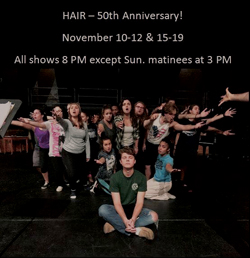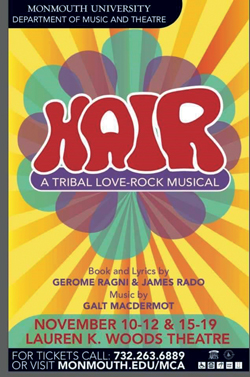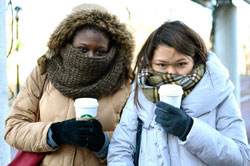Theatre is more than a form of entertainment, it is art. The stage can be used as a platform for self-expression, powerful messages, and political movements.
For example, in November of 2016, the cast of the Hamilton, a hip-hop musical inspired by the life of Alexander Hamilton, sparked controversy when they spoke out against Vice-President Mike Pence while Pence attended a performance. This cast of minorities expressed their concerns for the future of America and addressed the fact that they do not feel protected under the new presidential administration.
Chris Tuttle, a junior secondary education and English student, had insights on the connection between theatre and politics. Sticking to the theme of Hamilton, Tuttle explained that, “In a show like Hamilton there is this idea of independence, I need to be, I want to be free, I want to escape all of this.”
On top of that, Tuttle elaborated on how the producers of Hamilton made a large political statement by casting actors with African American, Hispanic, and other culturally diverse backgrounds as figures in history, for example, the character George Washington was played by Christopher Jackson in the original cast.
Tuttle stated, “…having a black man play George Washington is more impactful than a white man. In our generation you don’t see it like that. You see it as a certain color becoming the dominate power… it changes the way you’re seeing things.”
 The relationship between theatre and politics is complex. Communication professor, Nicholas Messina, made a notable point by saying, “I’m not always sure which came first, like the chicken or the egg. Did theatre impact politics or are politics impacting theatre?” Although it is difficult to uncover the mystery of who started this back and forth feud, theatre has shown the willingness to break boundaries by making bold choices on the stage.
The relationship between theatre and politics is complex. Communication professor, Nicholas Messina, made a notable point by saying, “I’m not always sure which came first, like the chicken or the egg. Did theatre impact politics or are politics impacting theatre?” Although it is difficult to uncover the mystery of who started this back and forth feud, theatre has shown the willingness to break boundaries by making bold choices on the stage.
“Theatre, in a contemporary sense, is not afraid to put that big middle finger out there when they need to… sometimes it’s difficult for individuals to go ahead and maybe look at social issues and politics, but if it is done through performance, a live performance at that, you can connect so much more to the audience,” Messina said.
Theatre has given the opportunity for performers to speak their minds about social issues they feel need to be brought to the public’s attention. Relating to that, performers have this ability to represent those who struggle to stand up for themselves.
Broadway is not the only stage where the voiceless are heard; college campuses are also known for pushing limits.
Evan Kudish, a senior music student, explained the importance of college level theatre, “This idea is especially significant on a college campus, since the students are the future leaders and are some of the most politically informed. I think that our University doing Hair this semester and it being the 50th anniversary of the show’s production is wonderfully fitting for the political status of our country.”
Hair is a rock musical that premiered on Broadway in 1968. This flower power musical dives into topics like the anti-Vietnam War movement, the sexual revolution, racism, peace, love, and the counterculture lifestyle.
Tuttle, who is playing the role of Woof in Monmouth’s production of Hair clarified that the show has, “the idea of free love and beauty and wonderful things happening in the world even if there is so much tragedy.”
Considering all the negativity in the world, Hair is the perfect production to present.
Hair will be playing Nov. 10-12 and 15-19 at the Lauren K. Woods Theatre, for tickets call: 732-263-6889 or visit Monmouth.edu/mca.
Come join the “Age of Aquarius”, spread the love, and embrace the immense impact theatre can have on society.
PHOTOS COURTESY OF Kara D’Antoni


